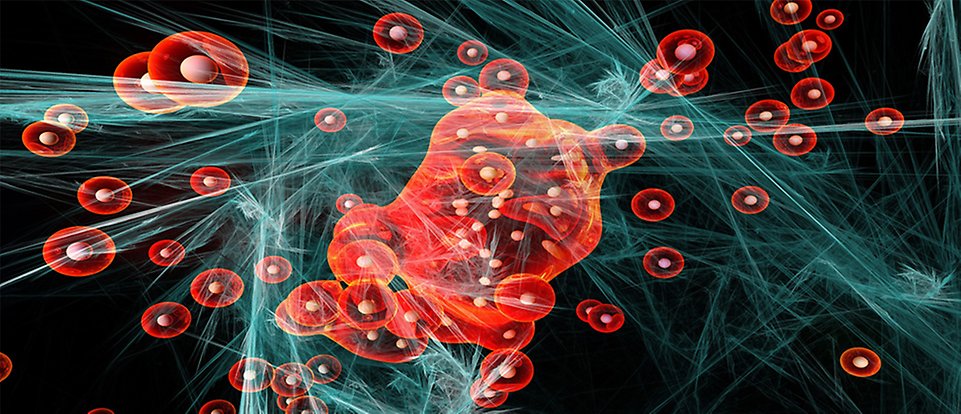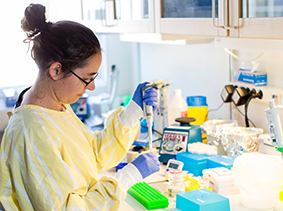Pharmacology

Description
The research group of Pharmacology does research on transporter proteins from the Solute Carrier (SLC) family and their role in cellular metabolism, in uptake of drugs and toxins and their potential as future drug targets. There are currently over 400 identified SLCs in human, with a role in transporting nutrients, amino acids, sugars, drugs and various other molecules across the plasma membrane as well as across the membranes of various organelles. Around 30% of these SLCs are currently orphan, meaning they have no known substrate, according to published literature. One main focus in my research group is to identify the substrates of transport for these orphan SLCs. We do this by screening using various systems, such as Thermal Shift, uptake assays and electrophysiological recordings in Xenopus laevis oocytes and eukaryotic cells.
One other main focus of our research is to identify the role the SLCs play in cells as well as whole cell organisms. For this we use gene knockouts in transgenic mice, gene knockdown in the fruit fly Drosophila melanogaster and CRISPR/CAS knockouts in cell-lines, primary cells and embryonic stem cells. We also employ large scale methods such as RNA Sequencing, microarrays, proteomics, high content imaging and metabolomics. Our ultimate goal is to identify which combinations of transporters different cells are expressing and which SLC on each cell are responsible for uptake of a certain substrate. With this information, drug targets can be selected, either for blocking or activating a certain function of the cell or to direct uptake of drugs or pro-drugs into specific cells.

Publications
Part of Current Biology, p. 998-100500, 2023
A useful tool or a new challenge? Hand-wrist-worn sleep trackers in patients with insomnia.
Part of Journal of Sleep Research, 2023
- DOI for A useful tool or a new challenge? Hand-wrist-worn sleep trackers in patients with insomnia.
- Download full text (pdf) of A useful tool or a new challenge? Hand-wrist-worn sleep trackers in patients with insomnia.
A weighted blanket increases pre-sleep salivary concentrations of melatonin in young, healthy adults
Part of Journal of Sleep Research, 2023
- DOI for A weighted blanket increases pre-sleep salivary concentrations of melatonin in young, healthy adults
- Download full text (pdf) of A weighted blanket increases pre-sleep salivary concentrations of melatonin in young, healthy adults
Acute Effects of Coffee Consumption.
Part of New England Journal of Medicine, p. 2105, 2023
Part of Translational Psychiatry, 2022
- DOI for Acute sleep loss increases CNS health biomarkers and compromises the ability to stay awake in a sex-and weight-specific manner.
- Download full text (pdf) of Acute sleep loss increases CNS health biomarkers and compromises the ability to stay awake in a sex-and weight-specific manner.
Part of The Lancet Healthy Longevity, 2023
- DOI for Association between accelerometer-measured amplitude of rest-activity rhythm and future health risk: a prospective cohort study of the UK Biobank
- Download full text (pdf) of Association between accelerometer-measured amplitude of rest-activity rhythm and future health risk: a prospective cohort study of the UK Biobank
Part of Sleep Medicine, p. 108-115, 2023
- DOI for Association between hypersomnolence and the COVID-19 pandemic: The International COVID-19 Sleep Study (ICOSS).
- Download full text (pdf) of Association between hypersomnolence and the COVID-19 pandemic: The International COVID-19 Sleep Study (ICOSS).
Part of npj Digital Medicine, 2023
- DOI for Association of accelerometer-derived circadian abnormalities and genetic risk with incidence of atrial fibrillation
- Download full text (pdf) of Association of accelerometer-derived circadian abnormalities and genetic risk with incidence of atrial fibrillation
Part of Diabetes Research and Clinical Practice, 2023
- DOI for Association of Circadian Rest-Activity Rhythms with Cardiovascular Disease and Mortality in Type 2 Diabetes
- Download full text (pdf) of Association of Circadian Rest-Activity Rhythms with Cardiovascular Disease and Mortality in Type 2 Diabetes
Part of Frontiers in Nutrition, 2022
- DOI for Association of Daily Eating Duration and Day-To-Day Variability in the Timing of Eating With Fatal Cancer Risk in Older Men
- Download full text (pdf) of Association of Daily Eating Duration and Day-To-Day Variability in the Timing of Eating With Fatal Cancer Risk in Older Men
Part of Journal of Sleep Research, 2023
- DOI for Association of poor sleep and HbA1c in metformin-treated patients with type 2 diabetes: Findings from the UK Biobank cohort study
- Download full text (pdf) of Association of poor sleep and HbA1c in metformin-treated patients with type 2 diabetes: Findings from the UK Biobank cohort study
Association of socioeconomic deprivation with sleep health in patients with type 2 diabetes.
Part of Diabetes, obesity and metabolism, p. 2937-2943, 2023
- DOI for Association of socioeconomic deprivation with sleep health in patients with type 2 diabetes.
- Download full text (pdf) of Association of socioeconomic deprivation with sleep health in patients with type 2 diabetes.
Part of BMC Public Health, 2023
- DOI for Associations between changes in habitual sleep duration and lower self-rated health among COVID-19 survivors: findings from a survey across 16 countries/regions
- Download full text (pdf) of Associations between changes in habitual sleep duration and lower self-rated health among COVID-19 survivors: findings from a survey across 16 countries/regions
Part of Nature Communications, 2023
- DOI for Associations of timing of physical activity with all-cause and cause-specific mortality in a prospective cohort study
- Download full text (pdf) of Associations of timing of physical activity with all-cause and cause-specific mortality in a prospective cohort study
Bridging the gap: The human and D. melanogaster repertoire of Solute Carriers
Part of Obesity, p. 635-641, 2023
- DOI for Effects of acute sleep loss on leptin, ghrelin, and adiponectin in adults with healthy weight and obesity: A laboratory study
- Download full text (pdf) of Effects of acute sleep loss on leptin, ghrelin, and adiponectin in adults with healthy weight and obesity: A laboratory study
Part of Clocks & Sleep, p. 458-465, 2022
- DOI for Effects of One Night of Forced Wakefulness on Morning Resting Blood Pressure in Humans: The Role of Biological Sex and Weight Status
- Download full text (pdf) of Effects of One Night of Forced Wakefulness on Morning Resting Blood Pressure in Humans: The Role of Biological Sex and Weight Status
Part of Scientific Reports, p. 3420, 2024
Habitual Short Sleep Duration, Diet, and Development of Type 2 Diabetes in Adults
Part of JAMA Network Open, 2024
- DOI for Habitual Short Sleep Duration, Diet, and Development of Type 2 Diabetes in Adults
- Download full text (pdf) of Habitual Short Sleep Duration, Diet, and Development of Type 2 Diabetes in Adults
Habitual short sleepers with pre-existing medical conditions are at higher risk of Long COVID
Part of Journal of Clinical Sleep Medicine (JCSM), p. 111-119, 2024
How Sleep-Deprived People See and Evaluate Others' Faces: An Experimental Study
Part of Nature and Science of Sleep, p. 867-876, 2022
- DOI for How Sleep-Deprived People See and Evaluate Others' Faces: An Experimental Study
- Download full text (pdf) of How Sleep-Deprived People See and Evaluate Others' Faces: An Experimental Study
Impaired procedural memory in narcolepsy type 1
Part of Acta Neurologica Scandinavica, p. 186-193, 2022
- DOI for Impaired procedural memory in narcolepsy type 1
- Download full text (pdf) of Impaired procedural memory in narcolepsy type 1
Melatonin: is it really a cardiovascular wonder pill for shift workers?
Part of The Lancet Diabetes and Endocrinology, 2024
Nightmare frequency is a risk factor for suicidal ideation during the COVID-19 pandemic.
Part of Journal of Sleep Research, 2024
Part of Diabetes, obesity and metabolism, p. 823-831, 2023
- DOI for Objective sleep characteristics and continuous glucose monitoring profiles of type 2 diabetes patients in real-life settings
- Download full text (pdf) of Objective sleep characteristics and continuous glucose monitoring profiles of type 2 diabetes patients in real-life settings
Obstructive sleep apnea during rapid eye movement sleep and cognitive performance in adults
Part of Sleep Medicine, p. 34-40, 2024
- DOI for Obstructive sleep apnea during rapid eye movement sleep and cognitive performance in adults
- Download full text (pdf) of Obstructive sleep apnea during rapid eye movement sleep and cognitive performance in adults
Part of Chest, p. 503-516, 2023
- DOI for OSA Is Associated With the Human Gut Microbiota Composition and Functional Potential in the Population-Based Swedish CardioPulmonary bioImage Study
- Download full text (pdf) of OSA Is Associated With the Human Gut Microbiota Composition and Functional Potential in the Population-Based Swedish CardioPulmonary bioImage Study
Part of Translational Psychiatry, p. 32, 2023
- DOI for Persistent short nighttime sleep duration is associated with a greater post-COVID risk in fully mRNA-vaccinated individuals.
- Download full text (pdf) of Persistent short nighttime sleep duration is associated with a greater post-COVID risk in fully mRNA-vaccinated individuals.
Part of Chronobiology International, p. 114-122, 2023
Sleep Duration and Visceral Adipose Tissue: Linear and Nonlinear Mendelian Randomization Analyses
Part of Journal of Clinical Endocrinology and Metabolism, p. 2992-2999, 2022
Part of Journal of Sleep Research, 2023
- DOI for Sleep symptoms are essential features of long-COVID - Comparing healthy controls with COVID-19 cases of different severity in the international COVID sleep study (ICOSS-II)
- Download full text (pdf) of Sleep symptoms are essential features of long-COVID - Comparing healthy controls with COVID-19 cases of different severity in the international COVID sleep study (ICOSS-II)
Sweet Dreams for Better Metabolic Health.
Part of Journal of Clinical Endocrinology and Metabolism, 2023
The association of insomnia with long COVID: An international collaborative study (ICOSS-II)
Part of Sleep Medicine, p. 216-222, 2023
Part of Hypertension, p. 503-522, 2023

